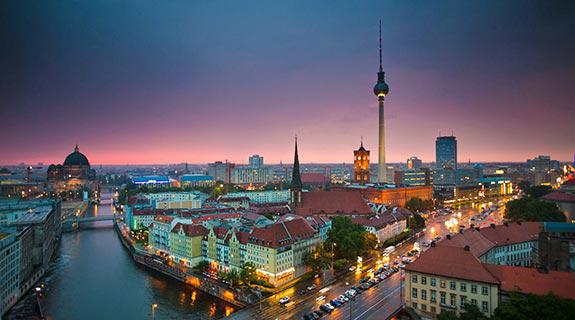When Europe’s leading entertainment marketers and designers arrive in Berlin for the 2015 PromaxBDA Europe Conference later this month, they’ll find a city that has traded Cold War intrigue for cutting edge creativity and innovation.
Cheap rents and a lower cost of living than many comparable cities has turned Berlin into an emerging hub for European creatives and artists who are embracing a business culture that values outside-the-box thinking, risk taking, and a forward-thinking attitude.
“Up until 15 years ago, Berlin was not the great creative destination that we know today,” said Clark Parsons, corporate development director at the Berlin School of Creative Leadership. “What has happened is that once the Wall fell, there was a natural sort of gravity that started pulling creative industries back to the city where they used to have their capital.”
Before World War II, Berlin reigned as a cultural capital of Europe, with thriving pop music, fashion, and film industries. The war and subsequent division of Germany proved disruptive to that creative class, to say the least, and most of the city’s industry decamped for the West German metropolises: finance to Frankfurt, trade to Hamburg and Dusseldorf, manufacturing to Stuttgart, and entertainment and media to Munich and Cologne.
Reunification led Berliners to initially believe that those industries would be coming back, but when that clearly wasn’t in the cards, the city realized it had to place its bets on future industries, Parsons said.
“Berlin is poor but sexy,” Parsons said. “They realized the only thing they had was the creative scene.”
An advertising industry that was vaguely based in Frankfurt and Dusseldorf has slowly migrated back to Berlin, which now hosts a thriving agency scene.
“About 15 years ago, almost none of the Art Directors Club of Germany Awards were going to Berlin-based agencies,” Parsons said. “Now more than half of the awards are awarded to Berlin agencies.”
And those agencies, Parsons said, are most likely to be found in the back courtyard building of an old industrial space or 150-year old apartment building, or a loft space with graffiti in the stairwell. The vibe can feel decidedly squatter at times. Most of the industry is centered on Mitte, Prenzlauer Berg, and Kreuzberg.
The Berlin agency culture is very low key, humble and energetic, and lacks the cut-throat pace of London or New York.
“You don’t do anything flash here; there’s a love of great design,” Parsons said.
Some of the most prominent agencies in the city include Heimat, (clients include SIEMENS, CNN, Hornbach, Adidas), Scholz & Friends, (clients include Vodafone, Axel Springer, Opel), and Art + Com Studios, which is moving beyond traditional agency work to include installation pieces and projects that merge creative and tech.
One area where Berlin still lags behind other German cities: agencies focused on entertainment marketing.
Publishing giant Axel Springer and MTV and its sister networks have set up shop in Berlin, but for the most part Cologne and Munich have fought to maintain their grip on the country’s entertainment and media industry.
But Berlin is proving more than attractive for tech startups, infusing the city with an appreciation for innovation and business that is reminiscent of the old Silicon Valley, said Bart Hendrikx, a global business development strategist and executive producer at Parosol Island, and agency with offices in Berlin and Dusseldorf.
Berlin entrepreneurs think global rather than local or European, Hendrikx said, with Soundcloud and Wunderlist epitomizing the type of business emerging from Berlin’s startup culture.
One of the most visible signs of Berlin’s emergence as a tech hub is The Factory, a complex created by Google and Simon Schaefer that hosts 23 startups on site. According to Hendrikx, Factory companies have raised 83 million euros in funds since the complex opened last June.
“There is this buzz going on,” Hendrikx said. “The essence of this is that people move to Berlin for the quality of life first, they they start thinking about a job and realize that his city is known to have an energy that people want to be a part of.”
For more information and to find out how to register for the 2015 PromaxBDA Europe Conference, visit promaxbda.org.
Tags:













































__twocolumncontent.jpg)











